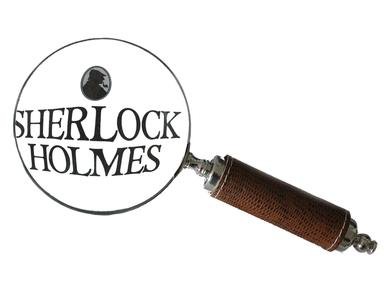Quiz Answer Key and Fun Facts
1. "'We are going well,' said he, looking out of the window and glancing at his watch. 'Our rate at present is fifty-three and a half miles an hour.'
'I have not observed the quarter-mile posts,' said I.
'Nor have I. But the telegraph posts upon this line are sixty yards apart, and the calculation is a simple one.'"
Which story does this passage come from?
2. "'One horse?' interjected Holmes.
'Yes, only one.'
'Did you observe the colour?'
'Yes, I saw it by the side-lights when I was stepping into the carriage. It was a chestnut.'
'Tired-looking or fresh?'
'Oh, fresh and glossy.'
'Thank you. I am sorry to have interrupted you. Pray continue your most interesting statement.'"
Which story does THIS passage come from?
3. "The Coroner: Did your father make any statement to you before he died?
Witness: He mumbled a few words, but I could only catch some allusion to a rat.
The Coroner: What did you understand by that?
Witness: It conveyed no meaning to me. I thought that he was delirious."
Which one of the fifty-six short stories does this dialogue appear in?
4. "'What do you imagine that this poor fellow meant by his last words: 'The professor -- it was she'?'
The professor shook his head.
'Susan is a country girl,' said he, 'and you know the incredible stupidity of that class. I fancy that the poor fellow murmured some incoherent, delirious words, and that she twisted them into this meaningless message.'"
In which interesting story will you find this conversation between Holmes and the professor?
5. " 'Whose was it?'
'His who is gone.'
'Who shall have it?'
'He who will come.'
'Where was the sun?'
'Over the oak.'
'Where was the shadow?'
'Under the elm.'"
Where can you find this strange sequence of questions and answers?
6. " 'I can spare you five minutes if you have anything to say.'
'All that I have to say has already crossed your mind,' said he.
'Then possibly my answer has crossed yours,' I replied.
'You stand fast?'
'Absolutely. '"
Which Holmes story harbours this exotic dialogue?
7. "'You would not call me a marrying man, Watson?'
'No, indeed!'
'You'll be interested to hear that I'm engaged.'
'My dear fellow! I congrat --'
'To Milverton's housemaid.'
'Good heavens, Holmes!'
'I wanted information, Watson.'
'Surely you have gone too far?'
'It was a most necessary step.'"
In which Holmes story does this appear?
8. "'I cannot possibly advise you if you try to deceive me,' said he.
'But I have told you everything.'
Holmes turned on his heel with a gesture of disgust. 'Good-night, Dr. Trevelyan,' said he.
'And no advice for me?' cried Blessington in a breaking voice.
'My advice to you, sir, is to speak the truth.'"
In which Holmes story will you find this interaction?
9. "'Do you see any clue?'
'You have furnished me with seven, but of course I must test them before I can pronounce upon their value.'
'You suspect someone?'
'I suspect myself.'
'What!'
'Of coming to conclusions too rapidly.'
'Then go to London and test your conclusions.'
'Your advice is very excellent. Miss Harrison.' said Holmes rising."
This discussion occurs in which story?
10. " 'You have done a good deal of digging by your callosities.'
'Made all my money at the gold fields.'
'You have been in New Zealand.'
'Right again.'
'You have visited Japan.'
'Quite true.'
'And you have been most intimately associated with some-one whose initials were J. A., and whom you afterwards were eager to entirely forget.'"
In which Holmes story, does this dialogue appear?
Source: Author
anubhav1990
This quiz was reviewed by FunTrivia editor
agony before going online.
Any errors found in FunTrivia content are routinely corrected through our feedback system.
